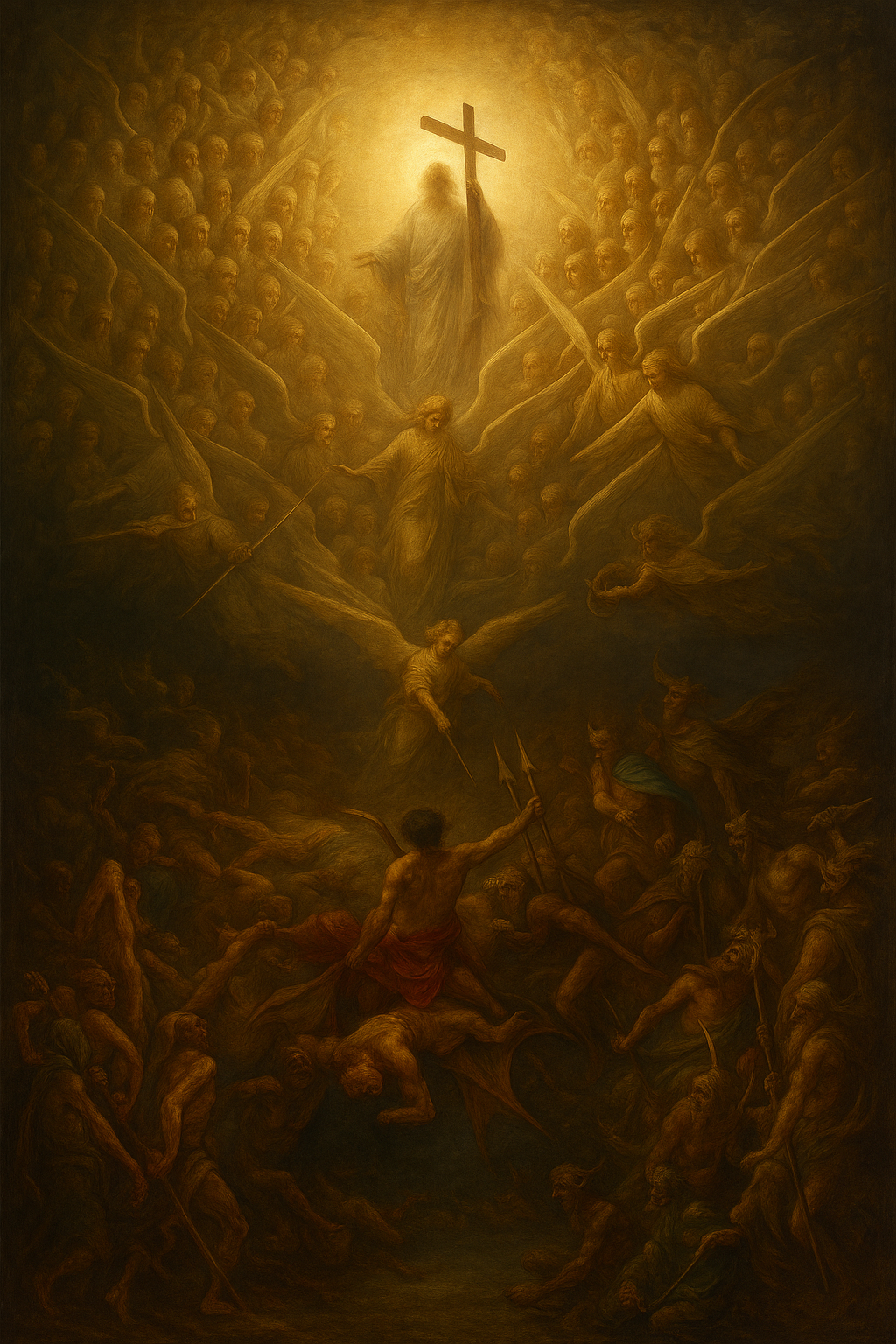The Bible’s Teaching on
The Divine Council Worldview (DCW)
What is the Divine Council Worldview? (Coming 2027)
-
Yahweh alone is the Most High God.
Heavenly beings (elohim) are real and active.
God rules in the midst of a divine council.
Yahweh is categorically distinct from every other elohim.
Heaven and earth reflect each other.
Some members of the divine council rebelled against God.
God disinherited the nations at Babel.
Israel was God’s covenantal response to rebellion.
Jesus Christ reclaimed authority in the heavenly realm.
Jesus Christ will extend his heavenly reign fully to the earth.
The people of God live amid ongoing spiritual conflict.
The divine council will be judged and renewed.
-
(Coming 2026)
-
What is the Divine Council Worldview (DCW)? is a biblical-theological work presenting twelve affirmations that introduce and explain the biblical reality of God’s heavenly assembly. At its heart is the confession that Yahweh alone is the uncreated Creator, sovereign over heaven and earth, distinct from all other spiritual beings. The book explores how Scripture portrays a divine council of elohim, the rebellion of certain council members, and God’s response in disinheriting the nations while choosing Israel as his covenant people.
Additionally, the book details how Jesus Christ has triumphed over rebellious powers, reclaimed authority in the heavenly realm, and will one day fully extend his Kingdom reign to earth. Along the way, readers are shown how heaven and earth mirror one another, why the church faces ongoing spiritual conflict, and how God’s final judgment will renew creation.
Each chapter will include an introduction to each of the twelve affirmations, a reflection on the necessity of each affirmation, and a study guide.
The Divine Council Worldview (DCW) posits that a heavenly assembly of spiritual beings exists under the authority of the supreme God, both ordering the cosmos and human destiny. Its origins are seen in ancient Near Eastern religions such as Mesopotamian, Egyptian, Canaanite, and Hittite traditions, which depicted divine assemblies governing the world. The Bible engages with this worldview, describing God’s appointment of the nations to spiritual rulers, their subsequent rebellion, and God’s ultimate judgment over them. Key themes include the reality of lesser elohim, the hierarchy of heavenly beings, and the compatibility of the DCW with biblical monotheism. Ultimately, the Scriptures use divine council language to demonstrate Yahweh’s unrivaled supremacy over all spiritual powers.
→ Introduce DCW to Your Church ←
Introducing challenging theological ideas in a church requires a pastoral approach that prioritizes humility, patience, and unity while grounding teaching in the language and themes of Scripture. Doctrinal development should proceed gradually by beginning with shared convictions, building understanding through connected biblical concepts, and clearly demonstrating why the teaching matters for spiritual formation rather than intellectual novelty. Careful attention should be given to tone and terminology so that unnecessary offense or misunderstanding does not hinder growth, while avoiding self-elevation, sensationalism, or presenting new ideas as corrections of past faithfulness. Meaningful change occurs over time as trust is maintained and Christ-followers are guided toward deeper understanding through consistent, faithful teaching.
Biblical Reenchantment, a biblical theology and divine council worldview podcast
The Biblical Reenchantment Podcast is a biblical theology and divine council worldview podcast that explores the supernatural and symbolic nature of Scripture within the ancient Near Eastern (ANE) context. Rather than reducing the Bible to abstract doctrine or moral lessons, this podcast helps recover the cosmic drama at the heart of God’s Word, where dragons, giants, and rebellious powers oppose Christ’s reign—and where Christ’s victory is proclaimed.
DCW Articles, Videos, and More
What Happened to the Divine Council?
The Biblical authors portray God as ruling from his throne in heaven, surrounded by a council of heavenly beings. This ‘divine council’ appears in multiple Old Testament passages, functioning as God’s heavenly court intended to mediate his governance to all the nations. But by the time of the New Testament, this council was removed from power due to rebellion against God and was replaced by the sole authority of Christ. To ask what happened to the divine council is to trace the story from creation to the consummation of God’s kingdom in the end.
Is the Divine Council Biblical?
Have you ever come across the phrase “the divine council” or “divine council worldview” and wondered why you haven’t heard much about it in the Bible? It’s there. But you may still ask, Who or what is the divine council in the Bible? What does it mean? And is the divine council really biblical? In short, Scripture presents God as surrounding himself with heavenly beings who deliberate and govern the cosmos on his behalf. What if I told you this concept runs from Genesis to Revelation and is central to understanding the biblical story?
Christus Victor and the Divine Council
Anthony Delgado and Joshua Sherman dive into key theological concepts surrounding the gospel, exploring the interplay between Christus Victor and penal substitutionary atonement. They discuss the centrality of Christ's kingship, the implications of the divine council worldview, and the practical aspects of discipleship. By examining the broader narrative of Scripture, they highlight how understanding God's wrath, love, and the cosmic powers of principalities and powers shapes a fuller comprehension of the gospel. The conversation also touches on how baptism serves as a pledge of allegiance to the kingdom of God and how believers are transformed through teaching and practical application. This interview offers an expansive view of the gospel’s reach, encouraging deeper reflection on its role in both individual and communal faith.
The Watchers and the Holy Ones
Syndicated interview with Chuck from Fire Theft Radio. How do we bring up the subject of fallen watchers and giants at church? Why is it even relevant to know about? Is this at all a subject worth discussing in bible study? Chuck has an amazing conversation with Pastor, Podcaster, and author Anthony Delgado on why this subject is filled with practical meaning and understanding of biblical history. I’ve always said, “The more you know your bible, the more you’ll know what you're doing here.” We discuss Anthony’s book (The Watchers And The Holy Ones) and how we can use this so-called weird knowledge in church, counseling, and even evangelism. Never be afraid to research biblical knowledge that might not fit your current paradigm. But if you do, ensure it’s grounded in biblical context. Anthony’s book creates that bridge for the evangelical community.
Divine Council Worldview Books:
The Unseen Realm (Heiser)
The Gospel is Bigger than You Think (Delgado)
For the Glory of God (Block)
The Lord of Spirits (Damick)
More Books on Biblical Theology and the Divine Council Worldview




